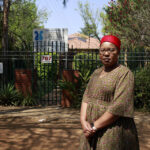‘I can’t mention who are the parties I am expecting litigation from but I can assure I know who they are.’
Health Minister Aaron Motsoaledi is preparing to be taken to court as he continues to propose changes in the healthcare system that could cost medical aid schemes millions.
Motsoaledi introduced the draft Medical Schemes Amendment Bill and National Health Insurance (NHI) Bill in Pretoria this week. The new legislation proposes significant changes to the way healthcare is funded and managed, including abolishing co-payments, prescribed minimum benefits and waiting periods for medical aid cover.
Medical aid schemes currently hold about R 60-billion in reserve — an amount almost 10% higher than what is statutorily required, said Motsoaledi speaking at a Pretoria press conference.
“These huge reserves were accumulated partly through high premiums but also by introducing the co-payments such that medical schemes avoid having to pay or even dip into the reserves if the situation demands,” he argued.
He says he is already expecting litigation against the department for some of the proposed Act amendments.
“I can’t mention who are the parties I am expecting litigation from, but I can assure I know who they are. I even know which legal firm is preparing to do something like that — but I won’t disclose that,” he told Bhekisisa.
The new draft legislation also proposes that schemes settle every cent charged to a patient. The Council for Medical Schemes (CMS) will also be lowering the percentage of funds schemes must keep in reserves to lower than the threshold of 25%.
“There are people who will scream that this amendment is outrageous and calculated to destroy medical schemes and leave beneficiaries with nothing.”
“I wish to assure you that this was well thought of. The load of complaints received from the public by us … as well as by the medical schemes’ regulator justifies this amendment,” Motsoaledi explained.
Privately-insured South Africans spent almost R30-billion in out-of-pocket payments in 2016, according to the latest CMS report. The regulatory body notes this figure only represents what people claimed back from their medical aids. About half of this expenditure went to paying for medicine and specialists.
Also gone will be Prescribed Minimum Benefits, a set of conditions that medical schemes are legally required to cover. In their stead, the new Acts introduce what more “comprehensive benefits” that extend mandatory cover to more everyday needs such as contraception, vaccinations and health screening. Healthcare funders will also no longer be able to impose waiting periods for new members.
South Africans pay about R2.2-billion to the country’s 8500 medical aid brokers if 2017 figures presented by Motsoaledi this week are any indication. With a newly introduced ban on the profession via the Acts, this money can now be used to purchase actual health services, he said.
“We want this money to be made available to pay for direct health expenses of members rather than serving brokers who are not needed in the healthcare system.”
The draft legislation also moots nixing hospital cash plans. Offered by companies such as Standard Bank, Old Mutual and Clientele Life for as little as R99 a month, this kind of cover can provide patients with R5 000 a day should they be hospitalised. But the bonus for these patients’ pockets has sometimes come at the expense of defrauding medical aids as funders foot the bill for their hospital stay.
A three-hospital survey by Discovery Health found that hospital admission rates among members with hospital cash plans were as much as 5.5 % higher than members without such insurance. Hospital stays among these members were also up to 60% longer, according to figures presented at a 2014 Discovery Health summit.
The Medical Schemes Act is only one of 12 pieces of legislation that need to be amended to allow the NHI to come fully into effect by 2026. Motsoaledi said changes to the National Health Act and the Mental Health Act had been prioritised in light of recent provincial crises including the collapse of oncology services in KwaZulu-Natal and the Life Esidimeni tragedy.
Proposed changes and decreasing medical aid tax benefits that started this year could free up at least R40-billion in new money for the NHI. More details on how South Africa will fund its move to universal healthcare are scant without draft legislation that will outline how the NHI Fund will work. The fund will become the single largest purchaser of health services from both public and private providers in the country under the NHI.
Key to this will be lowering the cost of private healthcare. Motsoaledi’s announcement comes just a week before the Competition Commission is expected to realise the results of a four-year investigation into private healthcare pricing. Activists are hoping that the commission’s work will finally reveal what drives what they say are high prices in the sector.
Motsoaledi has alleged that “vested interest groups” have tried to stifle the release of the commission’s findings.
“[They] are trying to block the release of the findings to the extent that they might even interdict it. I can only assume that they do not want the public to know the truth.”









